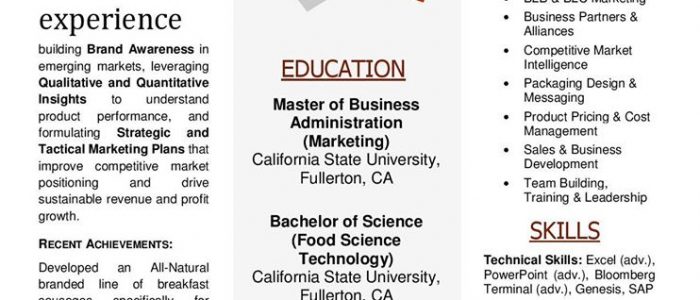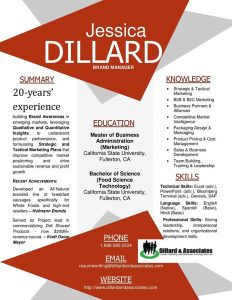
|
Getting your Trinity Audio player ready...
|
Some of you are wondering what a handbill and how is it useful. Where did I get this from? Let me share a valuable conversation I had with Jessica Dillard is the founder of Dillard & Associates is a National Career Staffing and Resume Writing Firm. I first met Jessica in 2014 when she joined my newsletter list a few years back. She has been listening to the podcast, and from time to time conversate on social media.
She created her firm in 1997 and possesses awards throughout her 20+ years in business. She posted this example of a handbill on Facebook:
photo: Courtesy of Jessica Dillard
Now I first heard of a handbill from my friend, Bill Holland who I featured several times on the podcast and blog. He wrote about this in his 2011 book, The 7 Rules for Getting Hired in Any Economy: Cracking the New Job Market. Jessica offers this to her clients for them to use at networking events and job fairs. This was not planned at all. But after some exchanges, I knew it would be useful to the world!
So here is our conversation as it happened on Facebook:
Me:
A colleague used to call this a handbill.
Jessica:
You’re spot on! We add this to our client’s portfolio to distribute during networking events, job fairs, etc. It doesn’t replace the resume, but in certain environments go before it
Me:
Jessica, it’s a brilliant strategy rarely talked about these days. I haven’t heard about it since 2011. Do you regularly create it for clients?
Jessica
Yes, we started incorporating it in 2016 and found clients who had several jobs over short periods of time and those with breaks in employment really benefited from it. More clients are now using them along with networking letters to encourage the call from recruiters. At that time, they then forward the longer, more detailed resume. (Landing a point of contact within the organization)
Me:
Excellent. What is the first point of contacts saying about them? Are they impressed? Do they feel burdened with another piece of paper?
Jessica:
I am still testing, but the responses, thus far, have been positive. One example is the email I received on yesterday from a client who was contacted directly by a Recruiter following a job fair asking him to complete an online application, attach his resume and call her to schedule the in-person interview.
However, the handbill still has to answer the #1 question, “Does this candidate possess the knowledge, skills, and abilities to do the job in question?” I’m looking forward to gathering more feedback this year
Me:
I noticed under knowledge you inserted whether someone has basic, intermediate, or advance skill level. When I wrote federal resumes that were an actual thing but there was a standard. Do you have that for your clients when they are fleshing out skill level (e.g., 50-74% proficiency-basic, 75%-89 intermediates, 90% advance)?
Jessica:
We were using Kenexa Prove It! (for years!!!) to test but found many clients weren’t fond of having to sit at their computers and take a test, as many would say, “Just to have a resume written.” So we moved away from Kenexa and now we use an assessment during our telephone interview. This gives me an opportunity to encourage clients to be truthful about everything they’re sharing including technical knowledge reminding them that an employer is going to want them to deliver on what they said they can do. Example: An advanced Excel user should be able to: Customize the work area; Use advanced functions (Names, VLOOKUP, IF, IS); Work with Pivot Tables; Use spreadsheet Web components; Manage Macro commands: concepts, planning, operations, execution, modification, interruption; Use personalized toolbars; and Perform some programming in VBA. As you, can probably imagine, I’ve had many clients ask to include under Technical Skills MS Office Suite with no proficiency indicators
Me:
So, this is more valuable to a job fair vendor or employer than a biz ![]() 💳? Should he or she have both?
💳? Should he or she have both?
Jessica:
I, of course, like both. But, I also LOVE tinkering with technology. Give me a resume or business card with a QR Code and my eyes light up. However, having worked high-volume recruiting for companies other than my own, there are limitations. Most IT departments block unfamiliar sites and social sites still. So, if your business card has a QR Code that points to a personal website, many Company Recruiters may never see it due to restricted access. Security is still a concern. But, when you’re talking with someone face to face and you leave them with a one-page information piece, you’ve eliminated the need to search any other sites or use any other tools other than a telephone or email to contact for more information
Me:
…then there is blue tooth technology.
Jessica:
This works well at University Career Fairs, but small businesses and Company sponsored fairs haven’t evolved much over recent years. I think we have to prepare job seekers in as many ways as possible
Me:
But use what they (job seekers) like; especially the job seekers overwhelmed by technology.
Jessica:
Absolutely!!! My more seasoned (senior) clientele push back when it comes to technology. As a result, I have to approach their career search a bit differently using more traditional means.
Summary
Let me point out the use of
But consider this: If you’re a seasoned professional (Gen X/Baby Boomer) and want to be shed the perception of being non-technical, why wouldn’t you adopt a strategy required tech savviness?
About Mark Anthony Dyson
I am the "The Voice of Job Seekers!" I offer compassionate career and job search advice as I hack and re-imagine the job search process. You need to be "the prescription to an employer's job description." You must be solution-oriented and work in positions in companies where you are the remedy. Your job search must be a lifestyle, and your career must be in front of you constantly. You can no longer shed your aspirations at the change seasons. There are strengths you have that need constant use and development. Be sure you sign up to download my E-Book, "421 Modern Job Search Tips 2021!" You can find my career advice and work in media outlets such as Forbes, Inc., Fast Company, Harvard Business Review, Glassdoor, and many other outlets.
